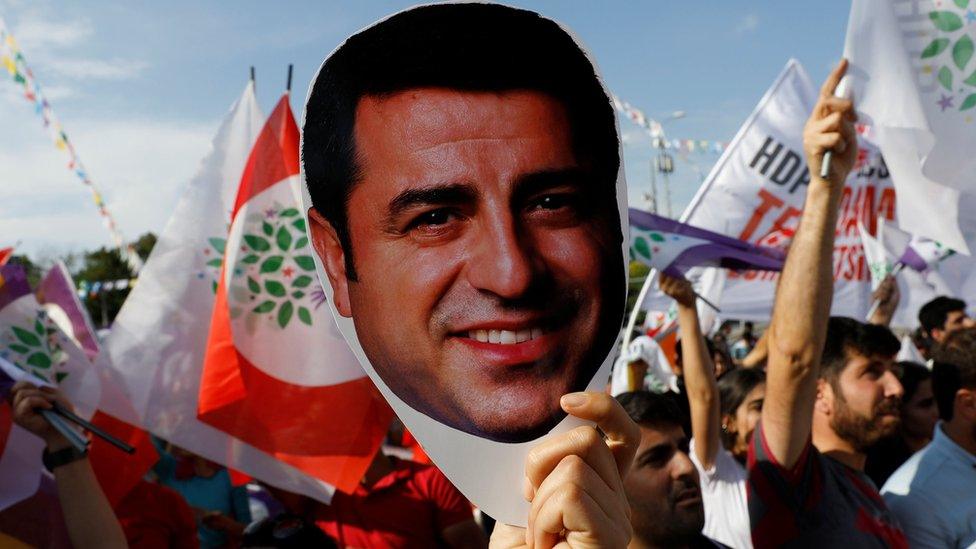Leyla Guven: MP on hunger strike for 77 days in Turkey
- Published
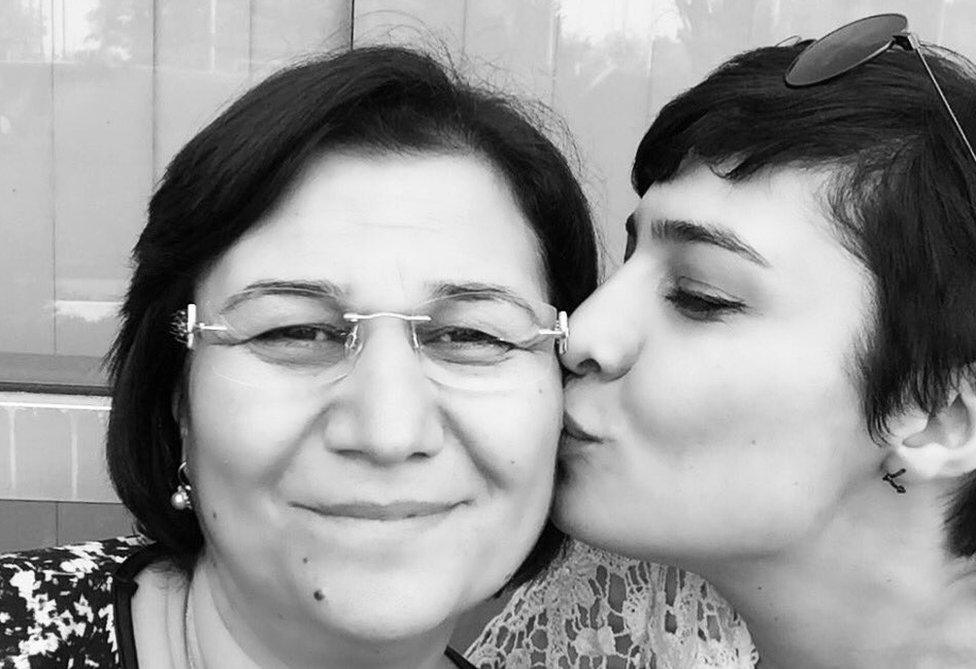
Sabiha Temizkan (R) says she is very worried about the decline in her mother's health
"Mum, don't leave me!" Sabiha Temizkan tweeted, in a desperate plea to her imprisoned mother Leyla Guven, now on hunger strike for 77 days.
She also posted a photo of herself planting an affectionate kiss on her mother's cheek.
Leyla Guven, 55, has been in jail since January 2018 for critical remarks about Turkey's military operation in the predominantly Kurdish town of Afrin in northern Syria.
Facing more than a 100 years in prison on charges of membership and leadership of an armed organisation, terror propaganda and inciting people to hatred, Ms Guven went on hunger strike.
An MP in declining health
She is both an MP for the pro-Kurdish People's Democratic Party HDP and the co-leader of Democratic Society Congress - an assembly of representatives from civil society organisations, political parties, lawyers, and human rights defenders.
The Turkish government accuses the congress of being linked to the militant Kurdish PKK group which has waged an insurgency in Turkey for over three decades, costing more than 40,000 lives.
Two former joint leaders of the HDP, Selahattin Demirtas and Figen Yuksekdag, have been in jail since 2016 on terrorism charges.
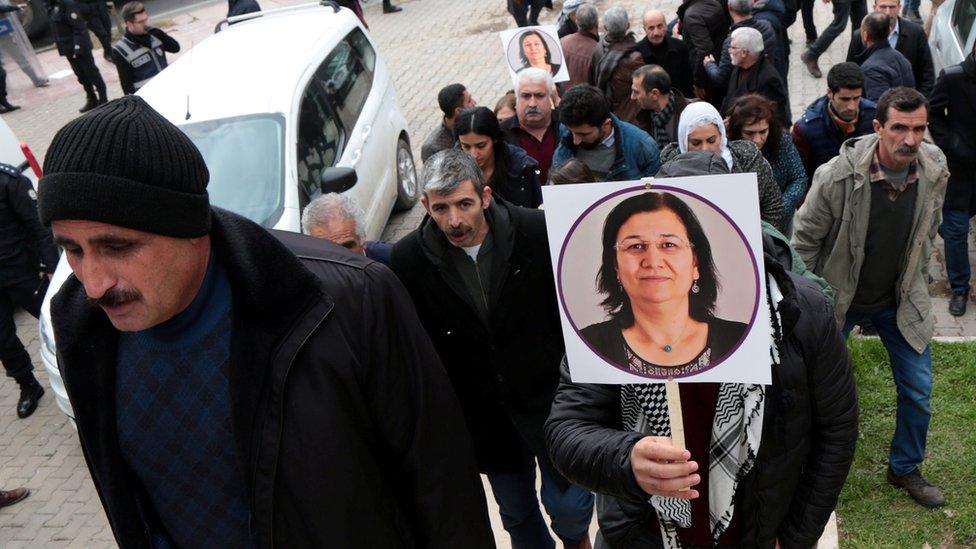
Demonstrations have been held in the mainly Kurdish city of Diyarbakir in support of Ms Guven
Since 8 November Ms Guven has consumed only on sugary and salty liquids and a complex of B vitamins.
She suffers from nausea, fever, severe headaches, insomnia and unstable blood pressure and is increasingly sensitive towards light and smell.
When asked by the BBC to comment on Ms Guven's hunger strike, Turkey's justice ministry declined to answer any questions.
'We are really worried'
"I saw her for the last time over a week ago. I was supposed to see her again today but she couldn't make it to the visiting room. Her health is in a very poor condition," Sabiha Temizkan told the BBC.
Her mother has lost 9kg and Ms Temizkan is very worried.
"The most critical thing at the moment is that she now has difficulty in drinking the liquid too."
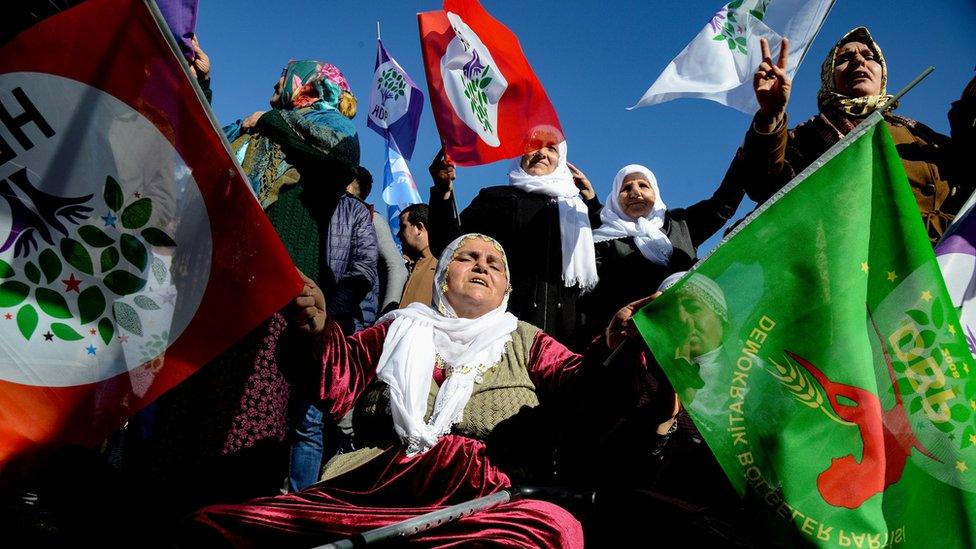
Thousands of people turned out for a protest in support of Ms Guven on Saturday
An ambulance is reportedly on standby in the prison yard and Turkey's health ministry sends doctors to examine her twice a day. But no independent doctors are allowed inside the jail.
Ms Guven has already refused forced feeding or any other intervention in case she loses her consciousness.
"It gives me unimaginable pain to see my mother going through this," her daughter says. "But I cannot ask her to end the hunger strike because she says she is doing this for peace," she added.
Thousands of people attended a rally at the weekend in the predominantly Kurdish town of Diyarbakir in support of Leyla Guven and her cause.
More than 250 political prisoners have started their own, indefinite hunger strike in solidarity with her.

Turkey keeps quiet on hunger strikes
By BBC Monitoring
Coverage of the hunger strikes has been very limited in mainstream and pro-government newspapers which dominate the Turkish press.
There has been almost no mention of Leyla Guven.
However, the online edition of Yeni Safak newspaper has described the hunger strikes as part of an international plan to "make Turkey submit". Milliyet's website said the PKK was trying to use it to "launch a mass movement".
The strikes have received more coverage in opposition media, and a low-circulation pro-Kurdish paper runs front-page coverage almost every day.

The only paper that has been covering Ms Guven's story has reportedly not been allowed in prisons recently, amid concerns that the hunger strike could attract more people.
What Guven wants
She went on hunger strike demanding an end to the isolation of the militant PKK's leader Abdullah Ocalan, who has been in a high security prison in Turkey since 1999.
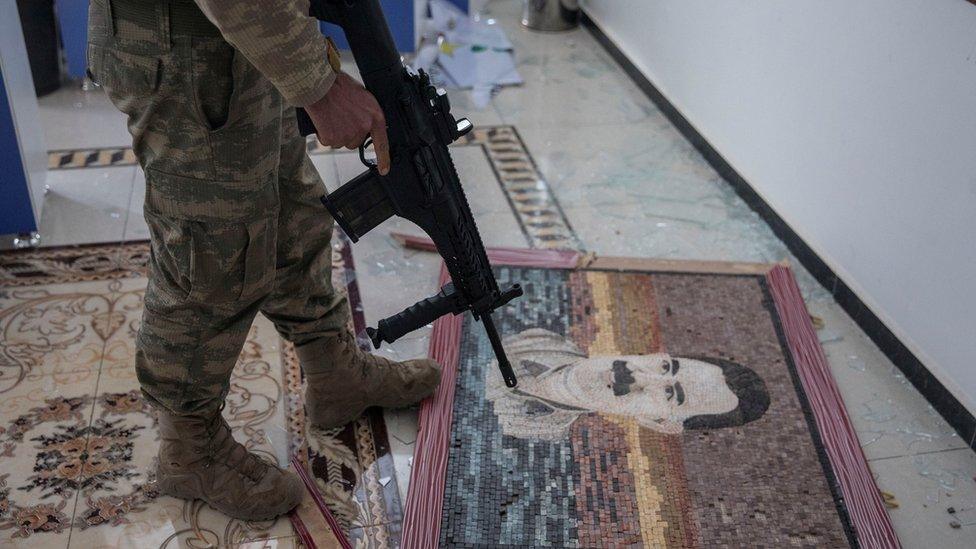
Ocalan is still seen as PKK leader after 20 years in jail - here a picture is torn down during the Turkish capture of Afrin in Syria
Ms Guven argues that by isolating him and by refusing to allow visits from his family or lawyers, the government has placed major impediments towards maintaining peace in Turkey.
Ocalan had been refused visits since September 2016 but in a remarkable twist that all changed last week, when his brother, Mehmet Ocalan, was permitted to see him.
However, that one-off visit was not expected to end Ms Guven's protest, her lawyer Reyhan Yalcindag told the BBC.
"During the hunger strikes back in 1996, a dozen people lost their lives. In 2000 when security forces intervened with the prisoners on hunger strike, dozens of people got killed," Ms Yalcindag said.
"Again people will die, coffins will be coming out of these prisons. How can the government turn a blind eye?" she asked.
- Published7 September 2018
